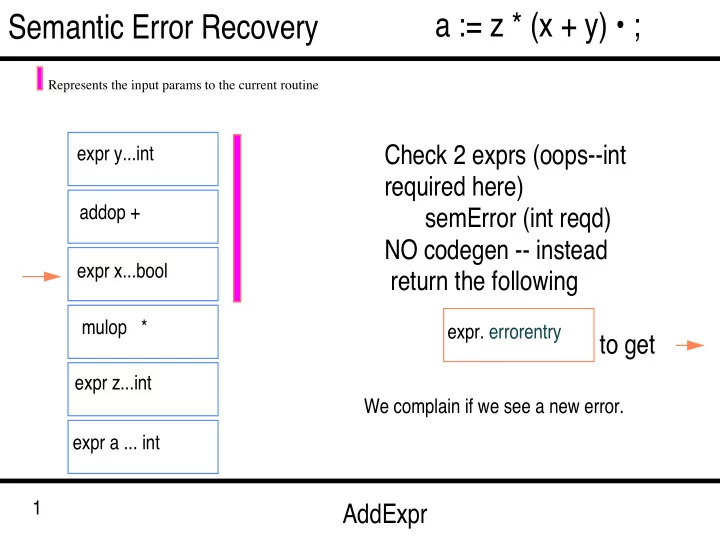

a := z * (x + y) ¥ ; Semantic Error Recovery Represents the input params to the current routine Check 2 exprs (oops--int expr y...int required here) addop + semError (int reqd) NO codegen -- instead expr x...bool return the following mulop * expr. errorentry to get expr z...int We complain if we see a new error. expr a ... int 1 AddExpr
a := z * (x + y) ¥ ; Semantic Error Recovery Check 2 exprs (previous error) semError (int reqd) NO codegen -- instead return the following expr. errorentry mulop * expr. errorentry to get expr z...int We donÕt complain if we see an old error, but we propagate it if expr a ... int possible. 2 MultExpr
a := z * (x + y) ¥ ; Semantic Error Recovery Check ST & ST-1 (previous error) semError (int reqd) NO codegen -- instead ST := ST - 2 We donÕt leave a special entry because the genStore protocol expr. errorentry doesnÕt leave any entries at all. expr a ... int 3 ParallelAssign
Semantic Error Recovery Rules: (a) Check for previous errors (special entry) if seen, - silently return error (b) Check for current errors (illegal types...) if seen, - complain and return error (c) Otherwise, do the right thing. Note: We only return an expression error if the function normally returns an expr. If not, the evidence of the error disappears from the run. 4
Semantic Error Recovery Notes: (a) Only one error message is issued. (b) All other action routines have a normal input protocol - except for the special entry. (c) Eventually the error entry disappears and you are back to normal processing. 5
Semantic Error Recovery Hint: 1. Build procedures to do this checking. Otherwise your logic will get convoluted. 2. You can also build two layers (or more) of procedures: The high level procs call the low level ones. You can build an equal method into the type descriptors to help with this. 6
Recommend
More recommend